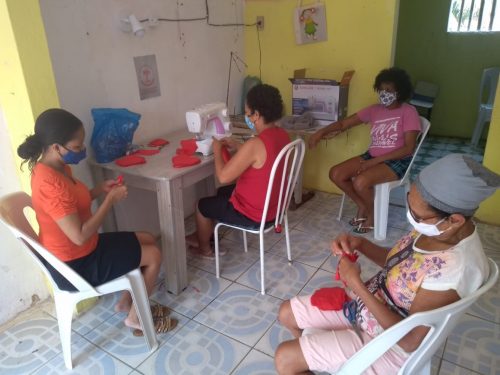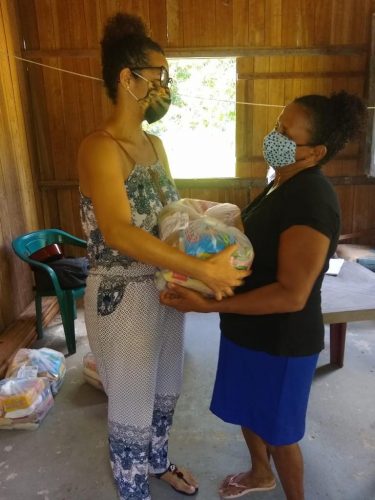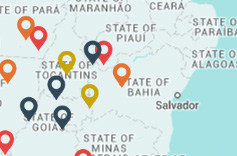By Mariana Rodrigues in collaboration with Rafael Ciscati
“I’ll tell you from the bottom of my heart: things are not looking good at all in the favela. People are really starving and the situation is getting worse. It is very hard to live here. Being part of resistance movements is very challenging in these territories.”
The person who opened up her heart is Eliene Maria Vieira, member of the Mothers of Manguinhos Collective, located in the northern part of the city of Rio de Janeiro. In partnership with the Center for Psychosocial Care for People Affected by State Violence (NAPAVE), the group has a project supported by Brazil Fund, ‘Weaving memories and resistance in Manguinhos,’ selected through the public call for proposals ‘Resistência’ [Resistance].
In this moment of severe social crisis in the country in which an increasingly high number of Brazilians suffer from hunger in all regions, the organizations, groups, and collectives supported by Brazil Fund report extreme difficulties in their territories. They are activists who experience, in their daily lives, data obtained from the National Survey on Food Insecurity in the Context of the Covid-19 Pandemic in Brazil. The said survey was conducted by the Brazilian Network for Research on Food and Nutrition Sovereignty and Security, the Penssan Network, and was released in April.

Community making of masks by Creuza Oliveira Collective, in Salvador (BA). Photo by Creuza Oliveira Collective
According to the survey, 55.2% of Brazilian families (equivalent to 116.8 million people) currently face some level of food insecurity – that is, they do not have full and permanent access to food. Of these, 19 million people (equivalent to 9% of the Brazilian population) are effectively starving. The survey was conducted in December, in 2,180 households in the five regions of the country, both in urban and rural areas. Hunger in Brazil has returned to the level of 2004, according to the survey.
The survey also showed that hunger is even more present in households headed by women (11.1%) and among Back families (10.7%).
Eliene, of the Mothers of Manguinhos Collective, says that she receives requests for help on a daily basis, coming from households with that same profile. “Most of them come from families headed by Black women. The average number of dependents is 4 to 7 people, and the situation has only worsened,” said Eliene.
To support civil society in the challenge of facing hunger, which has been aggravated by the Covid-19 pandemic, the Brazil Fund has joined efforts with the campaign ‘Se Tem Gente Com Fome, Dá De Comer’ [If there are hungry people, give them something to eat], which is mobilized by the Black Coalition for Rights (read more below).
Click here to get to know more about the campaign
Quilombos and settlements
In quilombola (descendants of Black people enslaved) communities, the spread of the pandemic coincided with a reduction in funding from the Ministry of Citizenship to purchase food. In 2020, the Ministry allocated BRL 7.3 million for purchase and distribution of food to “traditional and specific population groups.” The said amount is much lower than the figure for the same action in 2019, when it reached BRL 20 million.
Vercilene Dias, legal advisor to the National Coordination of Quilombola Communities (Conaq), says that the lack of funding made these communities vulnerable to hunger. “And this situation, of food insecurity, becomes worse every day,” she says.
Born in Quilombo Kalunga, in Goiás State, Vercilene explains that many quilombola communities are unable to produce enough food to feed their entire population. The situation is worse in territories whose land title has not been defined, and are still claimed by farmers. “As they are collective territories, it is difficult for quilombos to obtain funding for agricultural activities. And that hinders food production,” she says.
The Emergency Aid of 2020 was not enough to ensure food security for the poorest families. The Penssan Network survey also shows that 28% of the families who received the benefit lived in severe food insecurity, and 37.6% lived in moderate food insecurity.
In Maringá, Paraná State, the Milton Santos Association of Agroecology Education and Production Workers (Atemis), an organization that is also supported by the ‘Resistance’ call for proposals, has been carrying out actions in partnership with the rural reform settlement and camp to distribute food produced by family farming to socially vulnerable population. It was the way they found to mitigate the scarcity experienced by those who need to protect themselves from the coronavirus and fight for their lives.
“We have observed a significant increase in hunger in the region, especially among the poorest communities, which used to receive government assistance that has been suspended. It is sad to see that some families have to choose which meal to eat during the day. This entire situation caused by this disease, without a vaccine, without food, is like being on a plane without a pilot,” says Antonio Kanova Junior, deputy secretary of Atemis.
Regional Inequalities
Regional inequalities also play a crucial role in the proportion of the population affected by hunger. The Penssan Network survey showed that the North and Northeast have more households in a severe food insecurity situation. In the North region, 18.1% of families reported they are starving. In the Northeast, the proportion reaches 13.8%. These regions also have the highest percentage of loss of formal and informal work.
In Belém, the capital of Pará State, Sapato Preto Collective has made changes to its project supported by the Brazil Fund to help black, lesbian, bisexual, and trans women who have been in a situation of aggravated food insecurity in recent months. Sapato Preto Collective is supported by the call for proposals ‘Enfrentando o Racismo a Partir da Base’ [A Grassroots-Based Action Against Racism].

Action against hunger conducted by the Sapato Preto Collective (PA). Photo: Sapato Preto Collective
“Hunger has been a latent reality and has been coming together with the growth of the coronavirus crisis. Many LGBT and black women here work in the informal market. In the region, nearly 70% are part of this market and many have lost their jobs. So, these people are currently very vulnerable and we must help them,” explains Darlah Farias, coordinator of the Collective.
In Salvador, low-income neighborhoods, such as Santo Inácio, Calabetão, Mata Escura and the surrounding areas already faced structural problems, even before the pandemic, such as unemployment and poor access to healthcare, leading to a situation of exclusion and precariousness. Violence and hunger are some of the difficulties these population continuously experience.
According to Milca Martins, from the Creuza de Oliveira Women’s Collective, which promotes black women’s rights in that low-income area of Salvador, it is possible that even more people are starving. “Here, in the region where we live, if we really decide to map out the situation, it is certainly much worse,” she said.
The collective became supported by Brazil Fund in the call for proposals ‘70 Anos da Declaração Universal dos Direitos Humanos’ [70 Years of the Universal Declaration of Human Rights]. In view of the pandemic emergency, it submitted a request granted by Brazil Fund’s ‘Emergency Support Fund: Covid-19’ and received funds to provide food and essential items to families that were asking for help. Milca stated these collaborations made it possible for these families to carry on.
“We were able to buy food baskets and help over 500 women. Cleaning supplies, hygiene items, and food baskets were delivered. There was a woman who was going to garbage dumps, to recycling facilities, risking catching the virus in order to earn a living. Women and young people came to my house at night to ask for help,” she says.
The Creuza de Oliveira Women’s Collective also bought a sewing machine and started to produce masks for those families. “It was a means to help these women. We trained 10 women and they started making masks. And we delivered a set containing masks, food, hygiene items,” said the activist.
Se Tem Gente com Fome, Dá de Comer [If there are hungry people, give them something to eat]
To help fight the worst humanitarian crisis in recent times, Brazil Fund is supporting the campaign ‘Se Tem Gente com Fome, Dá de Comer’.
The Black Coalition for Rights initiative, in partnership with different movements and civil society organizations, seeks to guarantee resources to feed 222,895 families mapped out across the country, for a period of three months.
Brazil Fund’s efforts to support this action aim to help publicize the campaign and serve as a bridge between donors and this crucial humanitarian action in the most serious moment of the Covid-19 pandemic in Brazil.
The disease has already killed over 400,000 people, and has led to hunger, extreme poverty, and continued human rights violations among the most vulnerable communities. The amount obtained from the campaign, which will distribute food, as well as hygiene items and cleaning supplies. The distribution will take place at the headquarters of the over 200 organizations that make up the Black Coalition for Rights are located. Each family will receive, per month, BRL 200 worth in products.
Click here to get to know more about the campaign and watch a video about it.
Donate now! Tell people about the campaign! There is never time when it comes to hunger, and your help saves lives.
Tradução: Marcinha Macedo







